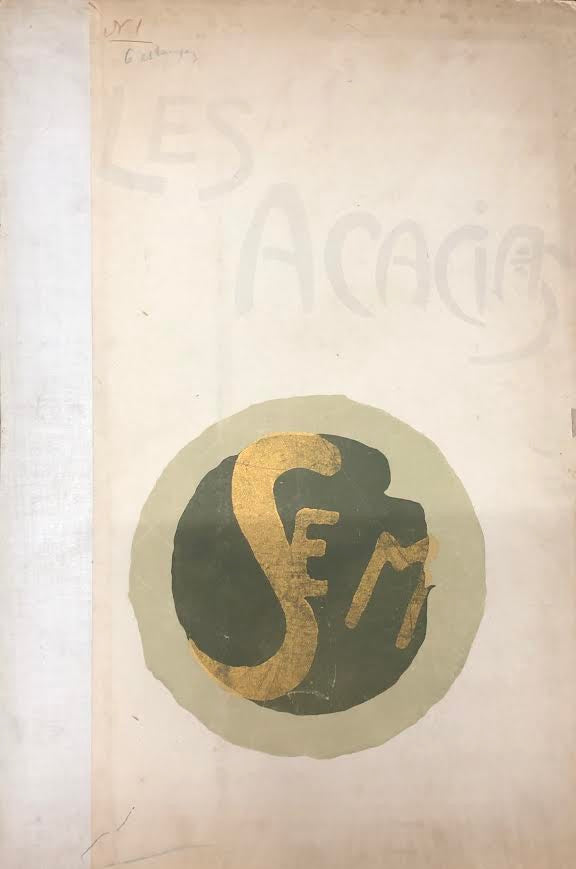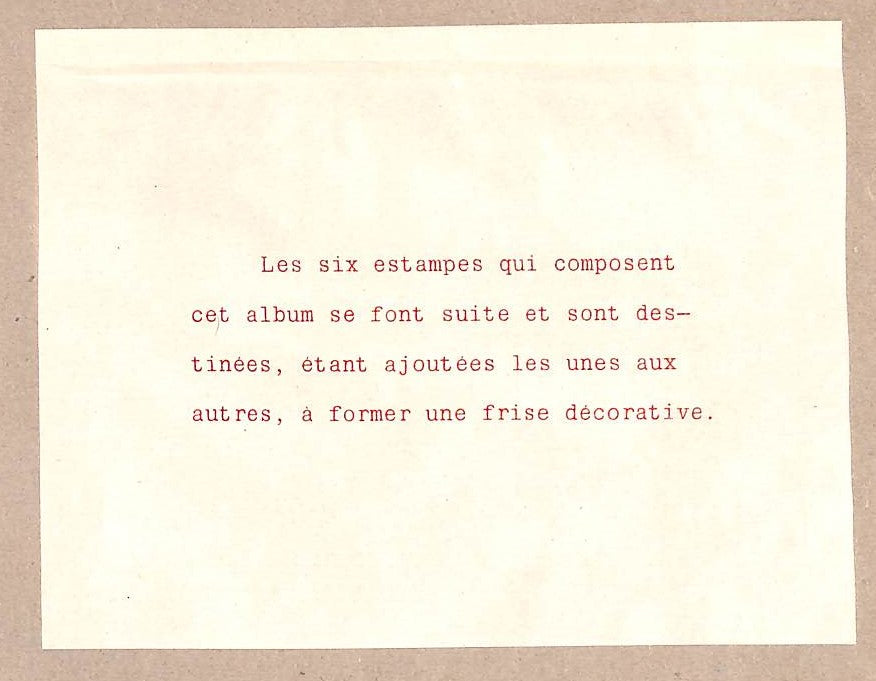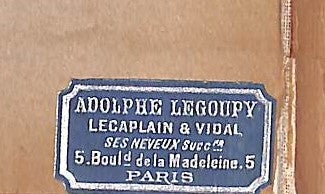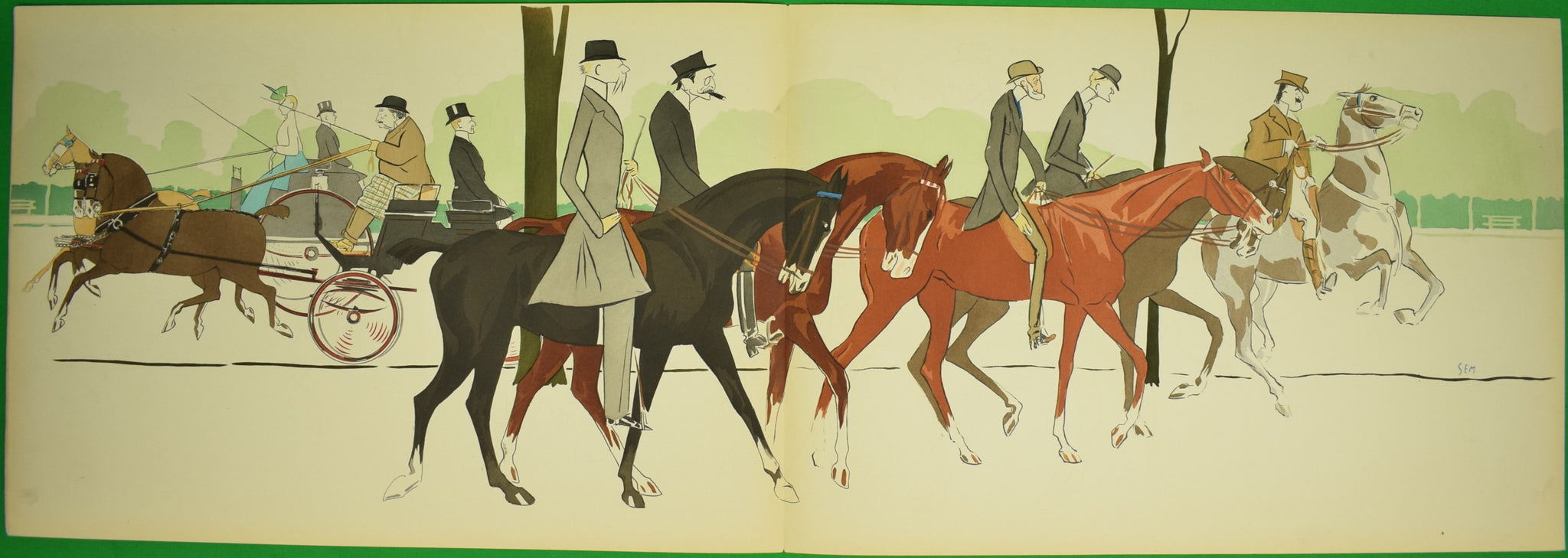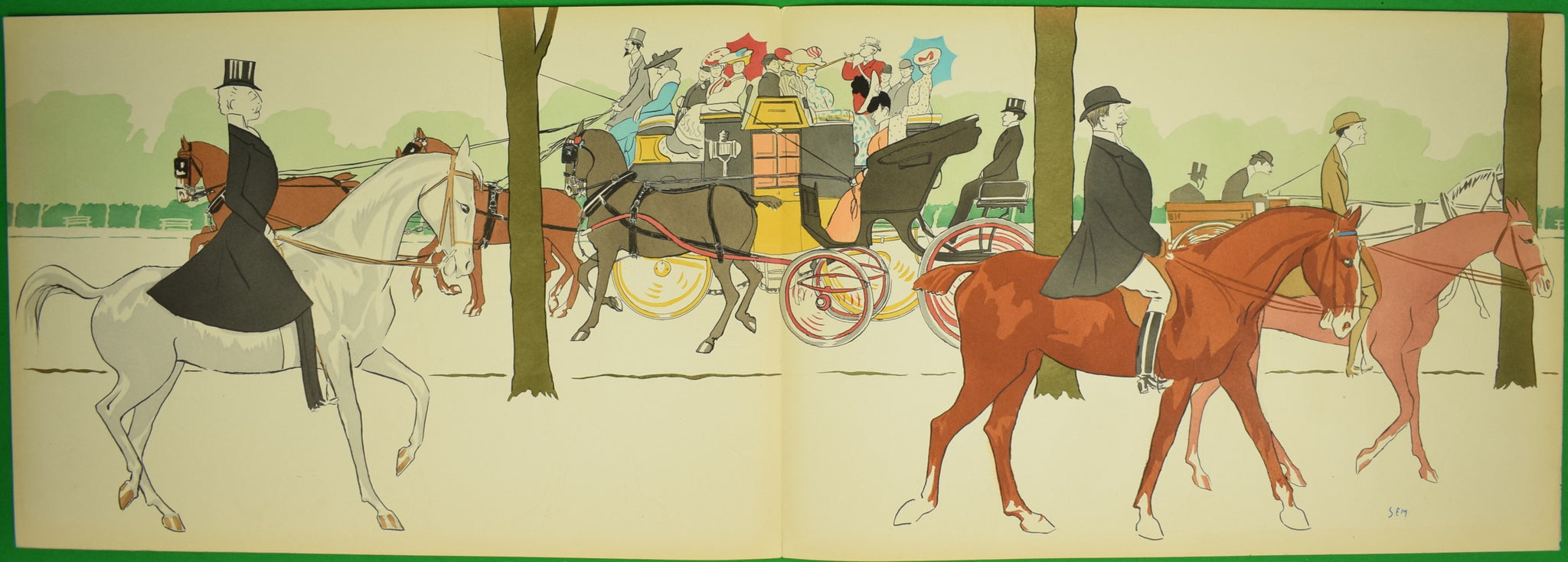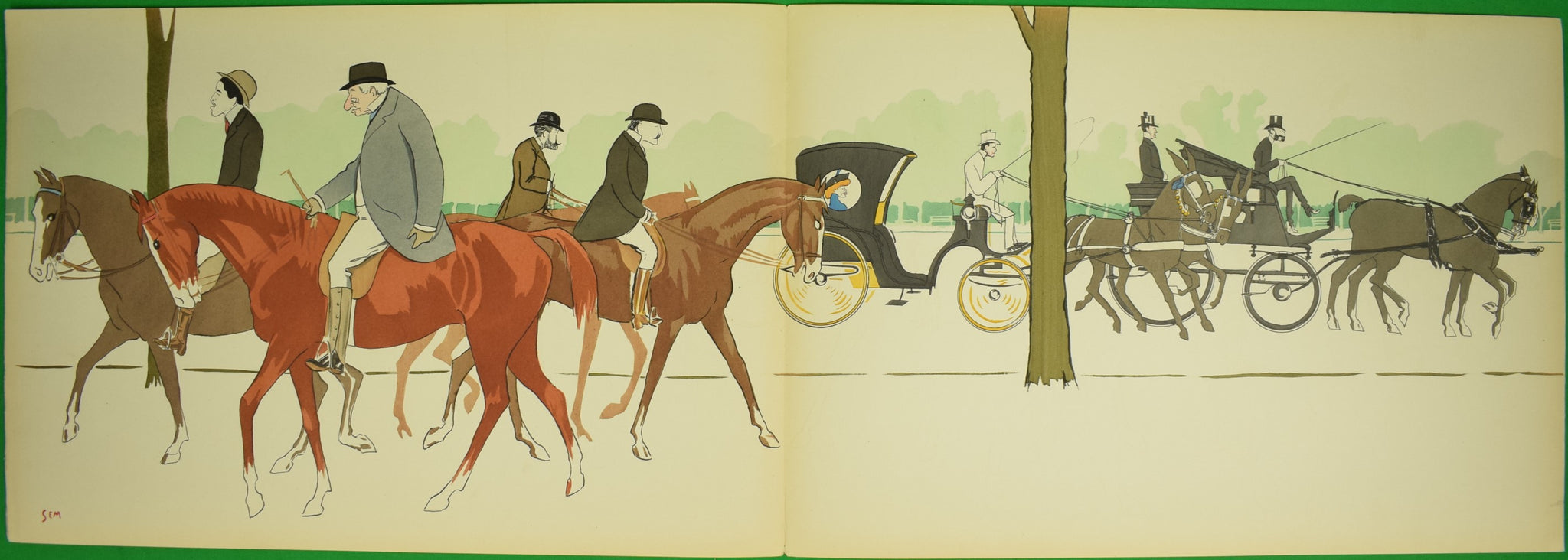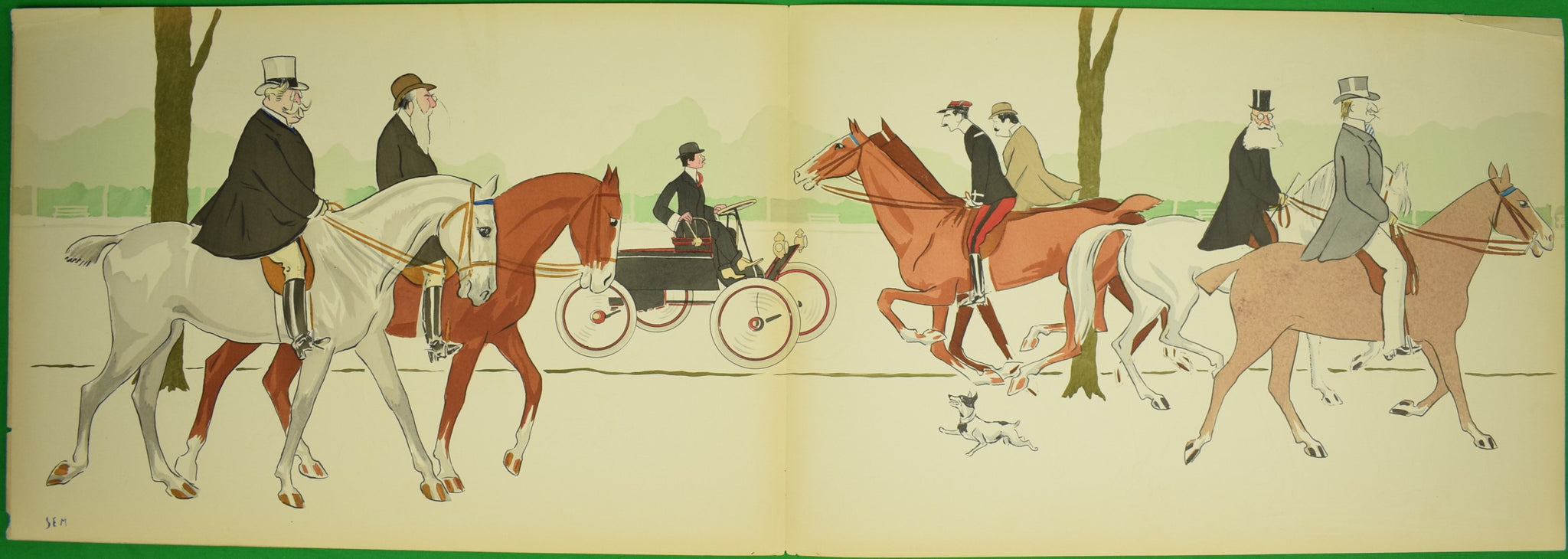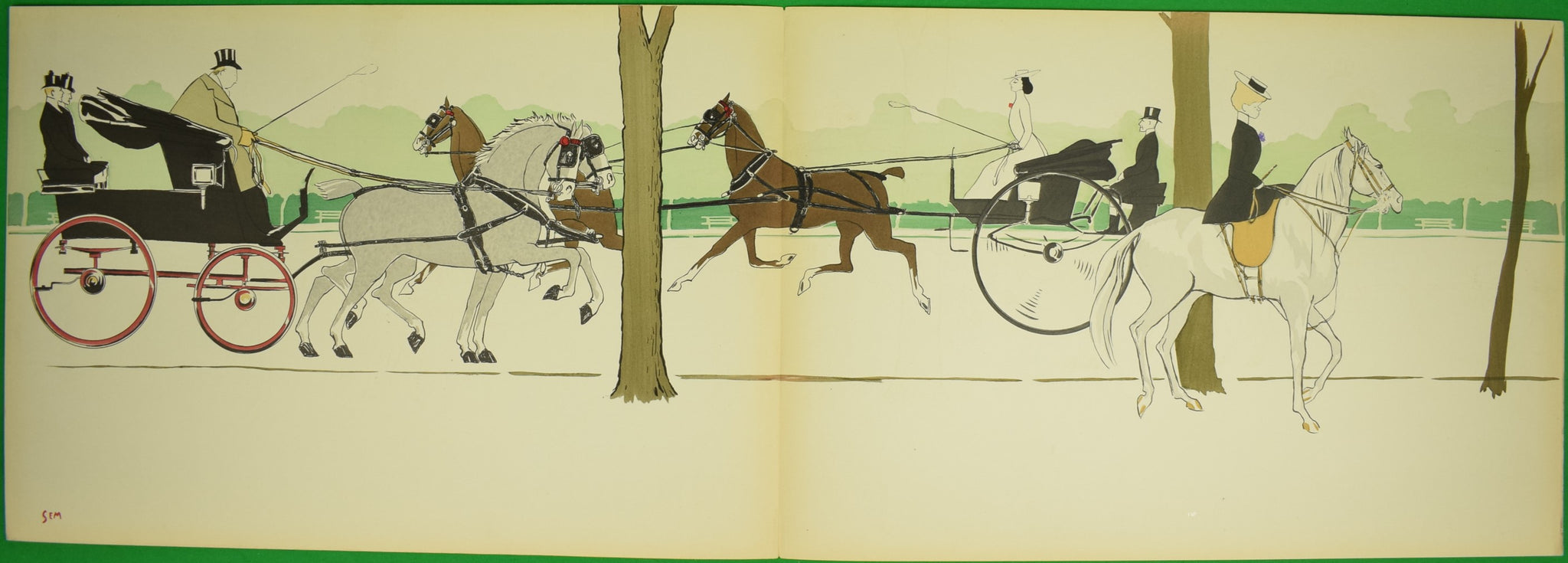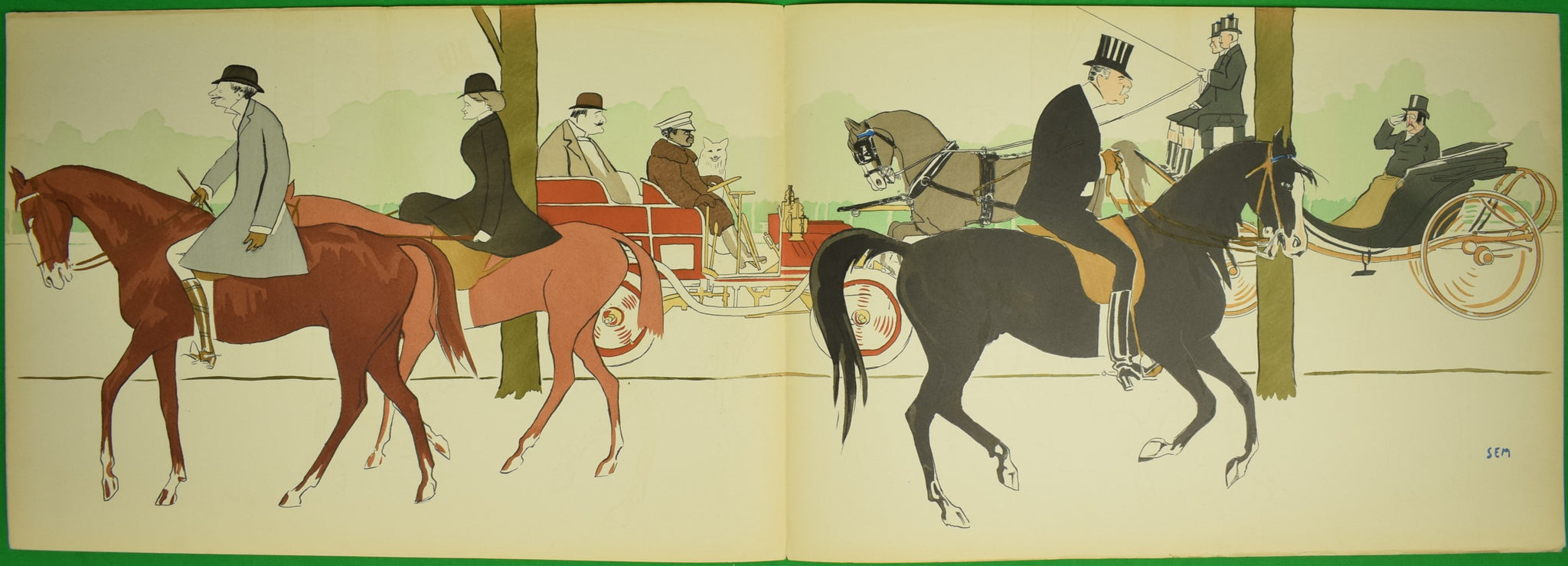Equestrian
"Les Acacias" SEM Folio (SOLD)
Price on Request $6,000
Suite of 6 double-plates each 14" x 41"
The six prints that make up this album are consecutive and are intended, being added to each other, to form a decorative frieze
Georges Goursat (1863–1934), known as Sem, was a French caricaturist famous during the Belle Époque.
Life and works
Youth (1863–1900)
Georges Goursat was born and raised in an upper-middle-class family from Périgueux. The wealth inherited from his father at the age of 21 allowed him to sustain a gilded youth.
In 1888 he self published in Périgueux his first three albums of caricatures, signing some as "SEM" (Figure, left), allegedly as a tribute to Amédée de Noé who signed his caricatures for Le Monde illustré as "Cham".
From 1890 to 1898, he settled for a few years in Bordeaux. During this period, he published more albums and his first press caricatures in La Petite Gironde [fr] and discovered the work of Leonetto Cappiello. His style matured, becoming both simpler and more precise.
During the same period, he made trips to Paris. In 1891, he designed two posters printed in the workshop of Jules Chéret (Figure, right) for the singer Paulus [fr]. He published his first caricatures of artists in L'Illustration (Albert Brasseur [fr]) and Le Rire (Paulus, Polin and Yvette Guilbert
From 1898 to 1900, he lived in Marseille. During this stay, he met Jean Lorrain who convinced him to live in Paris.
Caricature women on a boat being sailed by a sailor by Sem, 1925
Belle Époque (1900–1914)
Goursat arrived in Paris in March 1900, at the time of the opening of the Universal Exposition.
He picked horse races as his way of entry in high society. In June, three months after his arrival, he self-published a new album, Le Turf, with caricatures of many prominent Parisian socialites (Marquess Boni de Castellane, Prince Trubetskoy, Count Clermont-Tonnerre, Baron Alphonse and Gustave de Rothschild, Polaire). The success of this album made him famous overnight. In October of the same year, he published another album, Paris-Trouville, with the same success. Nine others followed until 1913.
In 1904, Goursat received the Légion d'honneur. In 1909, he exhibited with the painter Auguste Roubille, first in Paris, then in Monte Carlo and London. a diorama, composed of hundreds of wooden figurines "of all the merely Paris celebrities".
World War I (1914–1918)
Aged over 50 at the start of World War I, Goursat was not drafted. He nevertheless involved himself as a war correspondent for Le Journal.[20] Some of his rather "chauvinistic" articles had an "enormous impact". Ten were published in 1917 in Un pékin sur le front. Two others were incorporated in 1923 in another book, La Ronde de Nuit. In 1916 and 1918 Goursat published two albums of Croquis de Guerre (War sketches). Their style is completely different from his previous work. He also designed posters for war bonds.
Années Folles (1918–1934)
After the war, Goursat came back to the kind of caricatures that made him famous. In 1919, he published Le Grand Monde à l'envers (High Society upside down). Around 1923, he published 3 albums under the general title of Le Nouveau Monde (The New World). In 1923, he was made an officer of the Légion d'honneur. In 1929, he was severely impoverished by the economic crisis. After a heart attack in 1933, he died in 1934.
The six prints that make up this album are consecutive and are intended, being added to each other, to form a decorative frieze
Georges Goursat (1863–1934), known as Sem, was a French caricaturist famous during the Belle Époque.
Life and works
Youth (1863–1900)
Georges Goursat was born and raised in an upper-middle-class family from Périgueux. The wealth inherited from his father at the age of 21 allowed him to sustain a gilded youth.
In 1888 he self published in Périgueux his first three albums of caricatures, signing some as "SEM" (Figure, left), allegedly as a tribute to Amédée de Noé who signed his caricatures for Le Monde illustré as "Cham".
From 1890 to 1898, he settled for a few years in Bordeaux. During this period, he published more albums and his first press caricatures in La Petite Gironde [fr] and discovered the work of Leonetto Cappiello. His style matured, becoming both simpler and more precise.
During the same period, he made trips to Paris. In 1891, he designed two posters printed in the workshop of Jules Chéret (Figure, right) for the singer Paulus [fr]. He published his first caricatures of artists in L'Illustration (Albert Brasseur [fr]) and Le Rire (Paulus, Polin and Yvette Guilbert
From 1898 to 1900, he lived in Marseille. During this stay, he met Jean Lorrain who convinced him to live in Paris.
Caricature women on a boat being sailed by a sailor by Sem, 1925
Belle Époque (1900–1914)
Goursat arrived in Paris in March 1900, at the time of the opening of the Universal Exposition.
He picked horse races as his way of entry in high society. In June, three months after his arrival, he self-published a new album, Le Turf, with caricatures of many prominent Parisian socialites (Marquess Boni de Castellane, Prince Trubetskoy, Count Clermont-Tonnerre, Baron Alphonse and Gustave de Rothschild, Polaire). The success of this album made him famous overnight. In October of the same year, he published another album, Paris-Trouville, with the same success. Nine others followed until 1913.
In 1904, Goursat received the Légion d'honneur. In 1909, he exhibited with the painter Auguste Roubille, first in Paris, then in Monte Carlo and London. a diorama, composed of hundreds of wooden figurines "of all the merely Paris celebrities".
World War I (1914–1918)
Aged over 50 at the start of World War I, Goursat was not drafted. He nevertheless involved himself as a war correspondent for Le Journal.[20] Some of his rather "chauvinistic" articles had an "enormous impact". Ten were published in 1917 in Un pékin sur le front. Two others were incorporated in 1923 in another book, La Ronde de Nuit. In 1916 and 1918 Goursat published two albums of Croquis de Guerre (War sketches). Their style is completely different from his previous work. He also designed posters for war bonds.
Années Folles (1918–1934)
After the war, Goursat came back to the kind of caricatures that made him famous. In 1919, he published Le Grand Monde à l'envers (High Society upside down). Around 1923, he published 3 albums under the general title of Le Nouveau Monde (The New World). In 1923, he was made an officer of the Légion d'honneur. In 1929, he was severely impoverished by the economic crisis. After a heart attack in 1933, he died in 1934.
